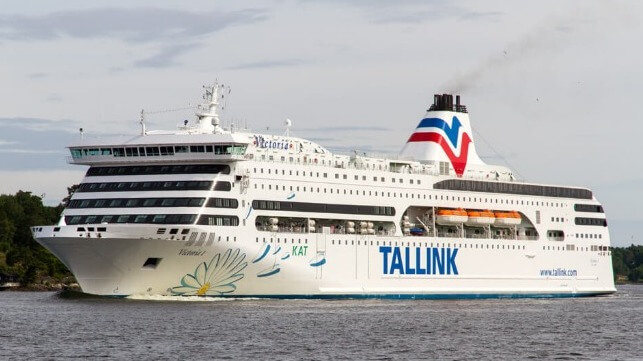Scottish Opposition Over UK Plan to Use Ferry to House Asylum Seekers

The United Kingdom government is facing opposition over plans to start housing asylum seekers aboard a chartered Estonian ferry docked in the port of Leith, near Edinburgh, in Scotland. The City of Edinburgh Council has come out strongly against the UK’s latest plan to use the Tallink ferry Victoria I to house asylum seekers, saying the council will not allow the ferry to become a “floating prison.”
Politicians and government ministers are continuing to spar over how to handle a worsening asylum seekers crisis. The government of UK Prime Minister Rishi Sunak has repeatedly proposed a temporary solution of using retired cruise ships or ferries to act as housing and processing centers for the migrants
Reports indicate that the Edinburgh Council was approached by the UK Home Office which is exploring the possibilities of accommodating the rising numbers of asylum seekers aboard the Tallink ferry. They highlight that the ferry has been servicing as temporary housing for Ukrainian refugees, but the Scottish government’s contract for the ferry is due to expire. The Victoria I is a 40,975 gross ton which is 635 feet long and nearly 20 years old. It has over 700 cabins with a maximum capacity of over 2,500 people.
Since June 2022, the Victoria I has been accommodating about 1,000 Ukrainian refugees under a contract with the Scottish government. The original contract was due to expire in December 2022 but was extended and is now due to end on July 11. The Ukrainian refugees have started to disembark from the ferry following the Scottish Government’s decision to end its use, with all on board expected to be moved into shoreside accommodations.
The Prime Minister cites data showing a significant increase in what the government calls “illegal, unnecessary, and dangerous” crossings of the English Channel. The UK reports more than 8,000 crossings of migrants so far this year, with June 11 reaching the highest single day of a reporting 616 individuals recorded crossing the Channel.
After proposing the idea to use ferries, the UK government announced plans to charter the Bibby Stockholm, an accommodation vessel. Built in 1976, and operated by Bibby Marine, the vessel has recently been refurbished and docked at Portland Port, in Dorset, with the plan calling for it to house up to 500 single male migrants over the next 18 months. The vessel’s docking in Dorset has prompted local government concerns that the presence of many migrants in a concentrated facility will require extra policing and support services.
The idea to also use the Victoria I converting it from housing Ukrainians to the broader migrant community, however, is drawing similar criticisms. The Edinburgh Council has written to the UK government seeking further details over the plans, adding that it was not consulted on the move that is bound to exert more pressure on its services and the city as a whole.
“While the MS Victoria I has been a place of refuge for many Ukrainian families arriving in Edinburgh, until we have adequate reassurances from the UK government regarding the welfare and ongoing engagement and support, we cannot allow it to become a floating prison for asylum seekers,” said Cammy Day, Council Leader. Day added that barring robust partnership discussions involving the National Health Service, police, and other colleagues, the council intends to continue opposing the plans in the strongest terms.
The Scottish Government, which signed the charter agreement for the ferry last year, asserts that it has also been kept in the dark regarding the plans. Reports indicate that they have also written to the UK’s Minister of State for Immigration seeking further details on the plans for the Victoria I.
